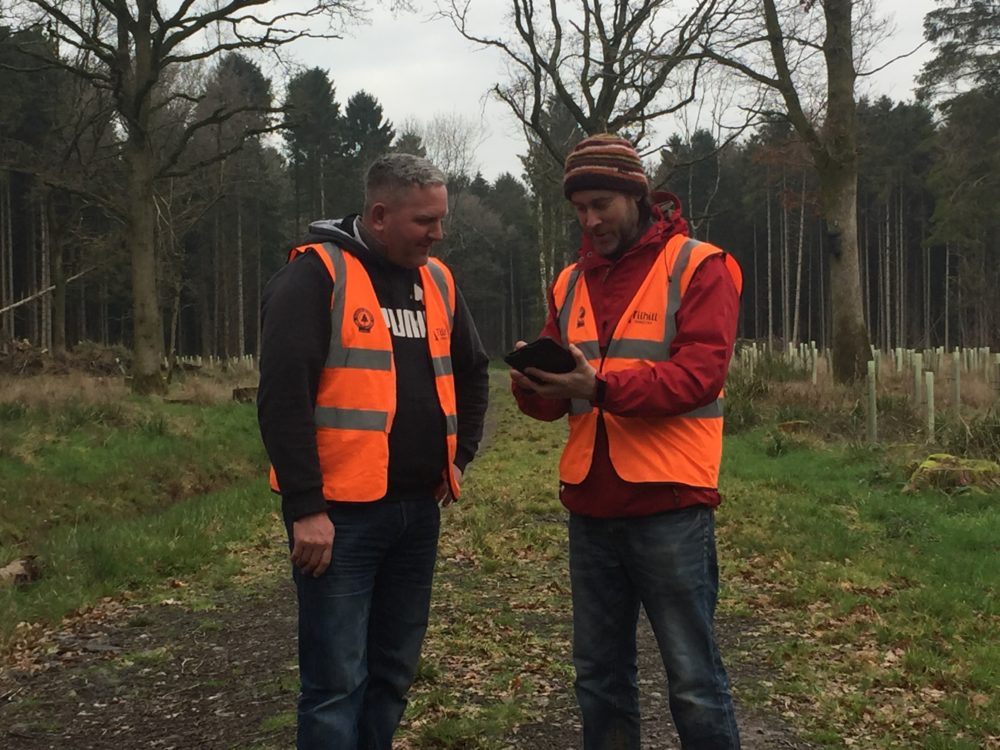Growing Our People: An interview with Graham Preece, Senior Forest Manager in Southern England.
“The company places a great deal of emphasis on management training and the development of softer skills”
What is your job role within Tilhill Forestry?
I work as a Senior Forest Manager in South West England. As a Senior Forester I take a leading role in improving the timber asset value of the woodlands I manage by applying a knowledge of silviculture with a good appreciation of the timber market to ensure the best return on an owner’s investment.
The role is broad and I manage woodlands for production, amenity and conservation under systems of CCF and PAWS restoration, with projects in woodland creation design & establishment as examples.
What do you do? Tell us about your typical day?
I like to get out and about at least a couple of times a week and catch up with work on site, see how contractors are getting on and just discuss how the work is going.
Safe working with contractors presents a challenge and an active on site presence does take a commitment of time, but you can hopefully be more flexible in your approach, build a rapport and encourage positive engagement and a sense of collaboration and ownership of the work.
How did you get into forestry?
It was quite a circuitous route really. I had worked in engineering but couldn’t quite settle into the all office environment so left to study environmental science with an aspiration to simply work in a more active and outdoor working arena. After graduating I worked oversees for a couple of years on social forestry projects and this ignited an interest in forestry. I worked on the saw for a short time then moved into management.
What do you like and not like about working in this industry?
It’s a varied role with a lot of autonomy which is great but it really does require a high level of commitment and integrity of approach to make absolutely sure you deliver as expected..
Why did you decide to work for Tilhill Forestry?
Serendipity decided! I was looking for opportunities up north but working in the South West of England has presented a range of novel opportunities and the opportunity to manage a wide variety of mixed woodland properties, which has helped maintain interest and presented fresh challenges.
What do you like most about this company?
I think it values its employees.
How do you feel Tilhill Forestry contributes to its employees’ professional development?
The company places a great deal of emphasis on management training and the development of softer skills but also supports continued professional development through technical training and actively encourages membership of the ICF. This is good, as you can help direct the training and your career in a direction you want or to help meet a recognised need.
As a comment on the wider industry I’m amazed that apprenticeships are not more prevalent. I come from a background in engineering where apprenticeships formed the cornerstone of on-the-job development and working in forestry where experiential learning and health and safety are also vital, this should be a key route to help bring people into the industry.
What sorts of changes are occurring in your occupation?
Post-Brexit policy issues can potentially have a profound influence on how the industry develops in the coming years, but whatever happens, there is the opportunity to lobby for forestry to be at the heart of any new land-use policy given its potential for growth in all sectors, such as employment and environment. We work in an unusual business sector that has a wider affinity with the public and the idea that products can be sourced locally and sustainably has genuine resonance. I personally feel that a company that also has a strong Corporate Social Responsibility will help to position itself favourably in a more cluttered sector.
How does a person progress in your field?
Your development is founded on reputation. It’s a genuine privilege and responsibility to help manage and steer the development of a natural asset, be it for an owner’s personal enjoyment, conservation interests or as an investment opportunity; so take the role seriously and always act with due diligence in your approach and above all be honest; this applies as much as to how much effort you put into the role. Show some passion, drive and commitment to the role and enjoy the job.
What is your advice to anyone wishing to pursue forestry as a career?
Try to get out into the woods as much as possible to gain on site experience and develop sound practical and technical skills; understand what the pressures are on profitability, find out what you enjoy and challenge ideas. You need to show integrity and a commitment to excellence and good customer care, so be prepared to go the extra mile and always look to add value to the job and take every opportunity to expand your range of knowledge. Be an independent thinker but follow protocols and seek advice!



